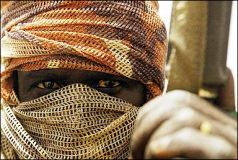Sudan extends pact with breakaway Darfur rebel group
By MOHAMED OSMAN
KHARTOUM, Sudan, July 23, 2005 (AP) — The Sudanese government on Saturday said it has extended an agreement with a strong breakaway rebel group in Darfur to work to improve the humanitarian situation.
 The National Movement for Reform and Development, which has a strong military presence in West Darfur State, also agreed to abide by a “declaration of principles” reached earlier this month by the government and Darfur’s two main rebel groups.
The National Movement for Reform and Development, which has a strong military presence in West Darfur State, also agreed to abide by a “declaration of principles” reached earlier this month by the government and Darfur’s two main rebel groups.
The National Movement signed a cease-fire agreement with the government last December, followed by two supplements on humanitarian and security arrangements.
On Wednesday, representatives from both sides met in Al Fasher, North Darfur, and signed an agreement to further their cooperation. U.N. and African Union officials were also involved in the meeting. The signing came after reviewing reports issued by joint committees assessing the situation since the December talks.
“The two sides have agreed to continue the work of the technical committee on the ground so as to help with the return of the refugees and the displaced persons to their home villages and to effect stability in the war affected areas,” said the joint statement that was distributed to the media Saturday.
Sharif Omar Badur, who headed the government’s delegation in the talks, said the areas controlled by the National Movement have witnessed stability and calm since December and the group has agreed to coordinate with the army to avoid any clashes.
He said the National Movement, unlike the two main rebel groups, has given priority to addressing humanitarian issues and prefers the provision of food and return of refugees come before political discussions.
“What is more interesting is that the government and the movement have agreed to respect and to abide by what the other parties reach in Abuja, Nigeria,” Ahmed Haroon, state minister of interior, told the same news conference at the Interior Ministry.
Earlier this month in Abuja, the main two rebel groups signed a “declaration of principles” with the Sudanese government, agreeing to broad commitments, including respecting Sudan’s unity, upholding democracy and “justice and equality for all, regardless of ethnicity, religion and gender.”
Darfur rebels took up arms in early 2003 against what they saw as years of state neglect and discrimination against Sudanese of African origin. The initial rebel groups were the Sudan Liberation Army and the Justice and Equality Movement. The National Movement for Reform and Development broke off from JEM in April 2004; its leader accused the main body of being more concerned with its political agenda in Khartoum than with the problems in Darfur.
Badur hinted that the National Movement might now have a stronger military presence than JEM, making them important players in negotiations.
“They have huge presence and huge potential and resources on the ground; their capabilities are huge,” Badur said. “The other (JEM) has strong presence in the media.”
Haroon, the state minister, said there are now at least five rebel factions in Darfur and that the situation is marred by “the mercurial status of the movement in Darfur.”
“But for us any gun that is moved out of the field is a victory,” Haroon said. “That is why we are ready to talk to any movement to bring stability to this region.”
